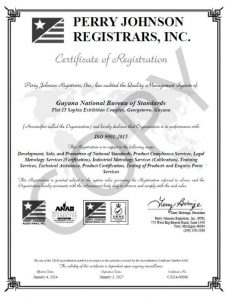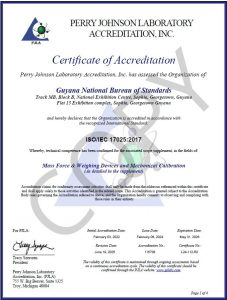As the Guyana National Bureau of Standards (GNBS) commences the verification of measuring instruments for the second half of 2022, one should not think that these instruments are limited to those that are used in the markets and shops countrywide. The mandate given to the GNBS under the Weights and Measures Act of 1981 also empowers its Inspectors to check and verify measuring instruments used in the petroleum industry to determine fuel quantities. This is particularly important at this time, given the high prices of fuel.
Instruments used in the local petroleum industry include bulk fuel meters, fuel pumps, wagon compartments and large capacity storage test measures and tanks with specific volumes. Verification conducted by the Bureau ensures that quantities of fuel dispensed and stored are within the acceptable measurement tolerances for accuracy.
The Bureau continues to verify hundreds of fuel pumps at gas stations countrywide, bulk storage tanks and meters, and the compartments of tanker wagons owned by large fuel companies such as Sol, Rubis and GUYOIL. In addition, the compartments of a significant number of privately owned fuel tankers (trucks) are also verified and are inspected for safety requirements based on the National Standard for Road Tanker Wagon.
During the verification process, standard test measures and meters are used by GNBS Legal Metrology Inspectors to determine whether measuring instruments used in trade are under-delivering (indicating below volume), or over-delivering (indicating above volume) or are within the acceptable tolerances (accurate). For instruments found to be inaccurate, the necessary adjustments are made by Inspectors and security seals are affixed to the adjusting mechanisms. This is to maintain the integrity of the verification process.
If a subsequent check is conducted by Inspectors of the GNBS and the affixed seals are found to be tampered with or removed, the operators or owners can face prosecution.
Further, if for one reason or another, a measuring instrument is not functioning properly, and cannot be verified when required, a security seal would be placed on the dispensing nozzle to prevent further usage until its accuracy is determined. This is necessary to prevent unauthorized use and to safeguard consumers.
At the gas stations, the entire verification process is intended to protect both suppliers and consumers (drivers) from financial loss. When a pump is over-delivering fuel, the gas station is selling at a financial loss. If a pump is under-delivering, then drivers are being short-changed. Similarly, fuel terminals also need to supply the correct quantities of fuel to petrol stations that are their customers so that they too can be satisfied.
The Bureau of Standards, therefore, serves to facilitate measurement transparency between sellers and consumers, thus ensuring fair trade and sound business practices, and ultimately protection for all.
Drivers are encouraged to make fuel purchases in metric quantities and to check fuel pumps for the GNBS approval seals. The presence of an approval seal on a fuel pump indicates that the pump was verified for the corresponding period.
For further information on this subject, call the GNBS on Telephone number: 219-0065 or 219-0069 or visit the Bureau’s website: www.gnbsgy.org






